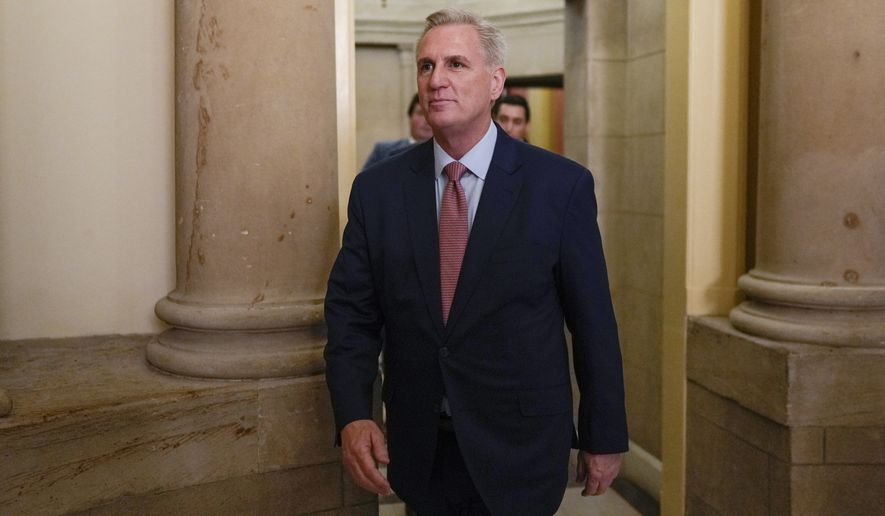A group of conservative Republicans thwarted Rep. Kevin McCarthy’s initial bid for speaker, leaving the House in a rare state of limbo on the opening day of the 118th Congress.
Mr. McCarthy, 57, came up short of winning a majority as the votes unfolded Tuesday thanks to a faction of lawmakers who voted mostly for Rep. Andy Biggs of Arizona, who is leading a just-big-enough GOP rebellion to stymie the California Republican.
No lawmaker won enough support to become speaker as Republicans and Democrats announced their choices in a voice vote. Unified Democrats voted for their new leader, Rep. Hakeem Jeffries of New York, and he came out ahead of Mr. McCarthy, 211 to 202.
Nineteen Republicans voted against Mr. McCarthy, among them 10 who voted for Mr. Biggs and nine who voted for other Republicans, including Rep. Jim Jordan of Ohio and former Rep. Lee Zeldin of New York.
No lawmaker was on track to win enough support to become speaker as Republicans and Democrats announced their choice in a voice vote.
The inconclusive speaker’s contest will leave the chamber in a rare moratorium, halting the opening day organizing and the swearing-in of all House lawmakers that is required to start the legislative session.
With no speaker or subsequent organizing, the chamber will operate under the authority of the House clerk from the preceding Congress, Cheryl L. Johnson, who was appointed most recently in 2021 by then-Speaker Nancy Pelosi, a California Democrat.
Ms. Johnson will preside over the chamber until a speaker is elected, and lawmakers are unsure of when that will happen.
Rep Ralph Norman, a South Carolina Republican, was among the GOP lawmakers who voted for Mr. Biggs. Mr. Norman said Mr. McCarthy has not fought hard enough during his eight years in leadership to leverage GOP strengths to lower federal spending and secure other conservative priorities.
Now that Mr. McCarthy’s first attempt at winning the gavel has failed, Mr. Norman wouldn’t say whether he’ll support Mr. McCarthy in any subsequent round of voting, or how long the House will operate without a speaker.
Conservatives are tired of having their priorities pushed aside, he said, and they want to ensure the next speaker makes them a priority.
The last time a speaker’s election was contested was in 1923, it took Massachusetts Republican Rep. Frederick Gillett nine ballots to win the gavel.
“If it takes a day or two days,” Rep. Ralph Norman said, “That’s a good thing.”
Mr. McCarthy, who has been a top GOP leader since 2011 and most recently served as minority leader, is not abandoning his quest for the gavel. His attempt to secure enough support from the Republicans who oppose him, however, could take hours or even days and require multiple rounds of voting on the House floor.
Mr. McCarthy’s bid for speaker was complicated by underwhelming Republican House wins in the midterm election. It left the GOP with 222 seats and a majority of only five lawmakers. Because the election of House speaker requires a vote of the entire House, Mr. McCarthy could only afford to lose four votes to win the gavel as Democrats voted in unison for their top leader, Rep. Hakeem Jeffries of New York.
Mr. McCarthy’s first-round loss threw the newly minted House GOP majority into uncertainty and exposed a significant rift in the Republican conference as it maps out an agenda in the new Congress.
Talks between Mr. McCarthy and a group of more than a dozen disgruntled rank-and-file members will continue Tuesday, according to Republican aides to the holdouts.
Mr. McCarthy enjoys the support of the vast majority of House Republicans and dozens of them have pledged to vote for him and no one else, no matter how many rounds of voting it takes.
He delivered an impassioned speech in a closed-door meeting with Republicans ahead of the vote, telling lawmakers, “I earned this job,” a source who was in the room told The Washington Times. “We earned this majority, and God dammit we are going to win it today,” Mr. McCarthy said.
Rep. Elise Stefanik, a New York Republican slated to head the GOP conference, nominated Mr. McCarthy for speaker, praising him for advancing a Republican agenda and working relentlessly to elect new GOP lawmakers.
“No one in this body has worked harder for a Republican majority than Kevin McCarthy,” Ms. Stefanik said.
Among the holdouts, most of them “absolutely want to leave room” for Mr. McCarthy to secure the votes, according to an aide. But he’ll first have to agree to demands that include a vote on congressional term limits, legislation that would institute a national sales tax in place of income taxes, a balanced budget agreement and other proposals.
The holdouts also want to reinstate a centuries-old rule that allows a single lawmaker to call up a vote to throw out the speaker in the middle of a Congressional session. They’ve rejected not only Mr. McCarthy’s offer to allow five lawmakers to call up a vote to eject the speaker, but have turned down a list of other concessions conservatives viewed as too vague.
“We’ve shown him a way to get to 218 votes and he said no,” an aide told The Washington Times. “It’s up to him.”
• Susan Ferrechio can be reached at sferrechio@washingtontimes.com.
• Kerry Picket can be reached at kpicket@washingtontimes.com.
• Mica Soellner can be reached at msoellner@washingtontimes.com.




Please read our comment policy before commenting.